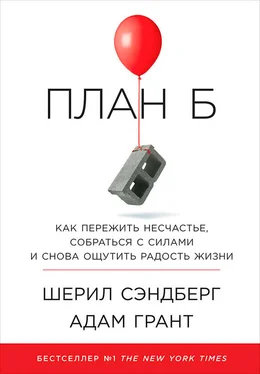46 % американцев не в состоянии: Board of Governors of the Federal Reserve System, "Report on the Economic Well-Being of U.S. Households in 2015," May 2016, по состоянию на 14 декабря 2016 г.: www.federalreserve.gov/2015-report-economic-well-being-us-households-201605.pdf.
Трагедия калечит не только настоящее: Sally Maitlis, "Who Am I Now? Sense making and Identity in Posttraumatic Growth," in Exploring Positive Identities and Organizations: Building a Theoretical and Research Foundation , ed. Laura Morgan Roberts and Jane E. Dutton (New York: Psychology Press, 2009).
Наши возможные «Я»: Hazel Markus and Paula Nurius, "Possible Selves," American Psychologist 41 (1986): 954–69; Elizabeth A. Penland, William G. Masten, Paul Zelhart, et al., "Possible Selves, Depression and Coping Skills in University Students," Personality and Individual Differences 29 (2000): 963–69; Daphna Oyserman and Hazel Rose Markus, "Possible Selves and Delinquency," Journal of Personality and Social Psychology 59 (1990): 112–25; Chris Feudtner, "Hope and the Prospects of Healing at the End of Life," The Journal of Alternative and Complementary Medicine 11 (2005): 23‒30.
«когда одна дверь к счастью закрывается»: Helen Keller, We Bereaved (New York: Leslie Fulenwider Inc., 1929), по состоянию на 29 декабря 2016 г.: https://archive.org/stream/webereaved00hele#page/22/mode/2up.
многие люди, пережившие горе, хотят помочь другим: Trenton A. Williams and Dean A. Shepherd, "Victim Entrepreneurs Doing Well by Doing Good: Venture Creation and Well-Being in the Aftermath of a Resource Shock," Journal of Business Venturing 31 (2016): 365–87.
«каждое новое начало – это»: Приписывается Луцию Аннею Сенеке; Semisonic, "Closing Time," Feeling Strangely Fine (MCA, 1998).
«Я верю, что изменился»: Stephen Schwartz, Wicked , original Broadway cast recording (Decca Broadway, 2003).
6. Верните в жизнь радость
Когда умирает любимый человек: Margaret Shandor Miles and Alice Sterner Demi, "A Comparison of Guilt in Bereaved Parents Whose Children Died by Suicide, Accident, or Chronic Disease," OMEGA: Journal of Death and Dying 24 (1992): 203–15.
При массовых увольнениях: Joel Brockner, Jeff Greenberg, Audrey Brockner, et al., "Layoffs, Equity Theory, and Work Performance: Further Evidence of the Impact of Survivor Guilt," Academy of Management Journal 29 (1986): 373–84; Barbara Kiviat, "After Layoffs, There's Survivor Guilt," Time , February 1, 2009: http://content.time.com/time/business/article/0,8599,1874592,00.html.
Жизнь, состоящая только в погоне за удовольствиями: Roy F. Baumeister, Kathleen D. Vohs, Jennifer L. Aaker, and Emily N. Garbinsky, "Some Key Differences Between a Happy Life and a Meaningful Life," The Journal of Positive Psychology 8 (2013): 505–16.
Сосредотачиваясь на других, мы обретаем: Adam M. Grant, Elizabeth M. Campbell, Grace Chen, et al., "Impact and the Art of Motivation Maintenance: The Effects of Contact with Beneficiaries on Persistence Behavior," Organizational Behavior and Human Decision Processes 103 (2007): 53–67; Adam M. Grant, "Does Intrinsic Motivation Fuel the Prosocial Fire? Motivational Synergy in Predicting Persistence, Performance, and Productivity," Journal of Applied Psychology 93 (2008): 48–58; Nicola Bellé, "Experimental Evidence on the Relationship Between Public Service Motivation and Job Performance," Public Administration Review 73 (2013): 143–53.
«радость – это величайший акт неповиновения»: Bono, цит. по: Brian Boyd, "Bono: The Voice of Innocence Experience," The Irish Times , September 18, 2015: www.irishtimes.com/culture/music/bono-the-voice-of-innocence-and-experience-1.2355501; цитата изменена с «акт неповиновения» на «величайший акт неповиновения» с разрешения.
Но счастье – это частота: Ed Diener, Ed Sandvik, and William Pavot, "Happiness Is the Frequency, Not the Intensity, of Positive Versus Negative Affect," in Subjective Well-Being: An Interdisciplinary Perspective , ed. Fritz Strack, Michael Argyle, and Norbert Schwartz (New York: Pergamon, 1991).
В исследовании скорбящих супругов: Frank J. Infurna and Suniya S. Luthar, "The Multidimensional Nature of Resilience to Spousal Loss," Journal of Personality and Social Psychology (in press): http://psycnet.apa.org/psycinfo/2016-33916-001/.
«То, как мы проводим наши дни»: Annie Dillard, The Writing Life (New York: Harper & Row, 1989).
« Счастье – это радость, которую ты находишь»: Tim Urban, "How to Pick Your Life Partner – Part 2," Wait but Why , February 2014: http://waitbutwhy.com/2014/02/pick-life-partner-part-2.html.
мы по своей природе легче замечаем плохое: Paul Rozin and Edward B. Royzman, "Negativity Bias, Negativity Dominance, and Contagion," Personality and Social Psychology Review 5 (2001): 296–320; Roy F. Baumeister, Ellen Bratslavsky, Catrin Finkenauer, and Kathleen D. Vohs, "Bad Is Stronger than Good," Review of General Psychology 5 (2001): 323–70.
Но сегодня мы уделяем слишком много внимания: Anita DeLongis, James C. Coyne, Gayle Dakof, et al., "Relationship of Daily Hassles, Uplifts, and Major Life Events to Health Status," Health Psychology 1 (1982): 119–36; Vivian Kraaij, Ella Arensman, and Philip Spinhoven, "Negative Life Events and Depression in Elderly Persons: A Meta-Analysis," The Journals of Gerontology Series B 57 (2002): 87–94.
Когда мы даем название негативным эмоциям: Michele M. Tugade, Barbara L. Fredrickson, and Lisa Feldman Barrett, "Psychological Resilience and Positive Emotional Granularity: Examining the Benefits of Positive Emotions on Coping and Health," Journal of Personality 72 (2004): 1161–90.
ведение записей о радостных событиях: Chad M. Burton and Laura A. King, "The Health Benefits of Writing About Intensely Positive Experiences," Journal of Research in Personality 38 (2004): 150–63; Joyce E. Bono, Theresa M. Glomb, Winny Shen, et al., "Building Positive Resources: Effects of Positive Events and Positive Reflection on Work Stress and Health," Academy of Management Journal 56 (2013): 1601–27.
Мы можем наслаждаться самыми незначительными повседневными событиями: Anthony D. Ong, C. S. Bergeman, Toni L. Bisconti, and Kimberly A. Wallace, "Psychological Resilience, Positive Emotions, and Successful Adaptation to Stress in Later Life," Journal of Personality and Social Psychology 91 (2006): 730–49.
Читать дальше
Конец ознакомительного отрывка
Купить книгу












